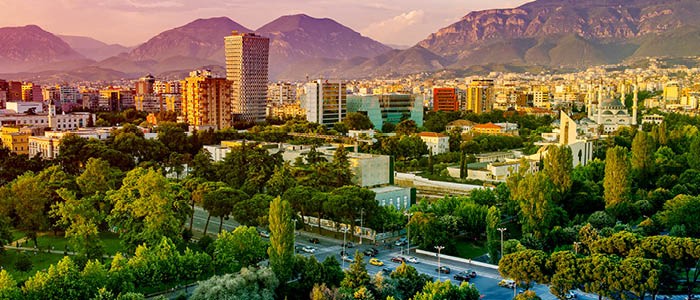With Albania’s construction industry accelerating, we spoke with Hoxha, Memi & Hoxha Partner Andi Memi and Tonucci & Partners Partner Enklid Milaj to find out what is being built and where.
Albania’s One-Sided Construction Boom
“Albania is going through a building spree – a trend that has been ongoing for some years now and, surprisingly, has continued during the COVID-19 pandemic,” Memi says. “During the last decades, Albania has been going, from time to time, through construction boom cycles, which are evidence of the different stages of transition that the country is going through,” Milaj adds.
According to Memi and Milaj, the statistics show an interesting trend in the construction industry. “For example, in 2020, 50% of the total domestic investment was focused on housing, as opposed to that of the other countries in the region, which was 25%,” Milaj notes. “For the year 2021, the number of building permits issued in Albania increased by almost 50% compared with the previous year,” Memi says, adding that the value of approved contracts “also increased, by around 30%, to EUR 819 million.”
Among the new projects, “the large majority of new constructions include residential buildings in major cities such as Tirana, Durres, Elbasan, Korca, and Vlora,” Memi says. In addition to residential buildings, “there are interesting construction projects that seem to be designed for tourism, especially in the coastal areas,” Milaj points out. And Memi agrees: “large accommodation structures are being built along the coastline, mostly in the south.” On the other hand, he points out “there are almost no new constructions for industrial purposes.”
Hopes and Fears
With overall expectations that the construction spree will contribute to economic progress for the country, there seem to be some concerns about the potential outcomes. “Construction represents one of the most important sectors of the Albanian economy and employs almost 8% of the workforce of the country,” Memi says. Despite the construction sector’s central role and the positive numbers, Milaj points out that “the construction boom is not becoming attractive enough to slow down emigration.”
One of the concerns, according to both Memi and Milaj, is the preservation of Albania’s landscapes. According to Memi, new buildings and hotels mustn’t “considerably damage Albanian nature and heritage, which are the main attractions for foreign tourists.” On the flip side, Milaj says that tourism-related projects, “if they are finalized and their destination is preserved, will likely have a significant impact in terms of the national economy.”
Looking back, Milaj says that “unfortunately, during the first phase of the transition and until recently, these construction projects developed in a chaotic manner and were characterized by abuse or lack of law enforcement. As time went by, there has been a moderate improvement.” According to him, the new construction projects still “certainly alter the skyline, the surrounding urban and social environment, and eventually raise the value of the property.” But he feels “they bring positive effects to the economy itself in a limited number of people – key stakeholders involved in these projects, such as investors, builders, and landowners.”
Finally, both lawyers report that the construction sector in Albania has frequently been financed by informal sources. “In a fragile economy like the Albanian one, construction is the sector where income from immigration and the gray economy can be easily channeled and recycled,” Milaj notes. “This impact on the economy is further facilitated by an often-unclear normative system, the lack of medium and long-term vision, and an unstable real estate regime.”
“Continuous concerns are expressed by both international and national financial organizations and authorities,” Memi also says. On top of that, he points out the construction sector’s central position in the country’s economy is a double-edged sword, noting the International Monetary Fund “has warned that the current construction boom carries risks to Albania’s financial stability, considering that the Albanian economy is vulnerable to a reversal in the rise of real estate prices.”
This article was originally published in Issue 9.11 of the CEE Legal Matters Magazine. If you would like to receive a hard copy of the magazine, you can subscribe here.






















